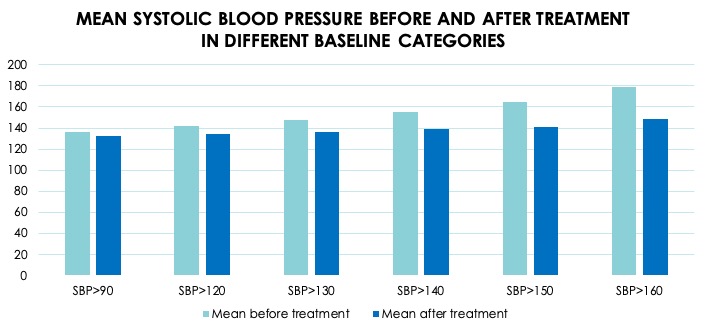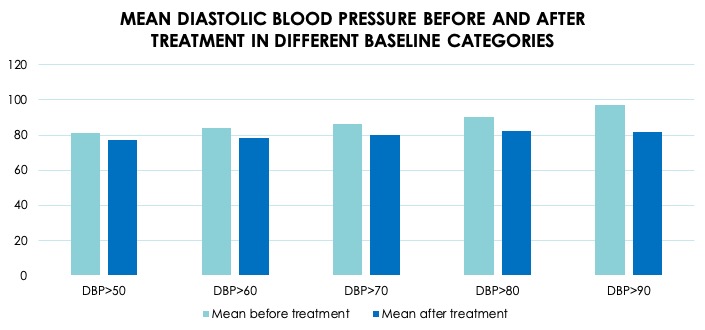Session Information
Date: Sunday, November 7, 2021
Title: Metabolic & Crystal Arthropathies – Basic & Clinical Science Poster I (0660–0682)
Session Type: Poster Session B
Session Time: 8:30AM-10:30AM
Background/Purpose: The relationship between change in serum uric acid level and progression of chronic kidney disease and hypertension is still conflicting. In this study, we aim to determine if lowering uric acid had any beneficial effect on blood pressure (BP) and kidney function in gout patients.
Methods: This was a retrospective study conducted in an outpatient clinic-based setting from December 2019 to December 2020. We obtained ethical approval from the Institutional Review Board of our hospital.
We recruited 77 patients on allopurinol therapy for gout based on the inclusion/exclusion criteria. All patients satisfied the 2015 Gout Classification Criteria by the American College of Rheumatology. Clinical determinants included mean BP (MBP), systolic BP (SBP), diastolic BP (DBP), estimated glomerular filtration rate (eGFR), creatinine, and uric acid. The change in clinical determinants was charted before initiation of allopurinol therapy and after being on treatment for 3-6 months. Patients clinical data was further divided into different subgroups based on gender male or female, age < 60 or >60, diabetic or non-diabetic, hypertensive or non-hypertensive, eGFR < 30, 30-59 and >60, SBP into six, and DBP into five subsets based on baseline SBP and DBP respectively. Potential confounders, like baseline co-morbidities and the antihypertensive treatment, were also charted. Patient data were recorded and analyzed through Excel sheets to obtain a p-value to explain the statistical significance.
Results: Patients on allopurinol treatment for gout for 3-6 months, showed a significant reduction in MBP 3.2 mm Hg (p-value 0.034) particularly in the group >60 years of age. SBP mean reduction was 3.7 mm Hg but didn’t reach statistical significance. However, in the subgroup of patients with eGFR< 30, the reduction of SBP was statistically significant with a p-value of 0.05. DBP reduction was statistically significant in all patients with a mean reduction of 3.8 mm Hg (p-value 0.008). When we analyzed subgroups separately based on baseline SBP and DBP the greatest change was seen for the highest baseline systolic and diastolic BP and was statistically significant. The eGFR improved in subgroups of female, age >60, eGFR < 30, and eGFR 30-59, and creatinine improved in a subgroup of eGFR < 30, but didn’t reach statistical significance. The uric acid reduction was highly statistically significant in all groups (p-value < 0.001).
Conclusion: Through this study, we were able to find a statistically significant change in MBP, DBP, and SBP (in a subgroup of patients with eGFR< 30) with allopurinol treatment. Though we were not able to demonstrate any statistically significant effect on eGFR and creatinine, there was an improvement noted in kidney function in a few subgroups. Such a result could be due to the small sample size for our study. The effect of allopurinol can be utilized in the future for BP control in hyperuricemic patients.
To cite this abstract in AMA style:
Faraz A, Islam S, Grisanti J, Iqbal S. The Impact of Allopurinol on Blood Pressure and Renal Outcome in Gout Patients: A Retrospective Study [abstract]. Arthritis Rheumatol. 2021; 73 (suppl 9). https://acrabstracts.org/abstract/the-impact-of-allopurinol-on-blood-pressure-and-renal-outcome-in-gout-patients-a-retrospective-study/. Accessed .« Back to ACR Convergence 2021
ACR Meeting Abstracts - https://acrabstracts.org/abstract/the-impact-of-allopurinol-on-blood-pressure-and-renal-outcome-in-gout-patients-a-retrospective-study/



